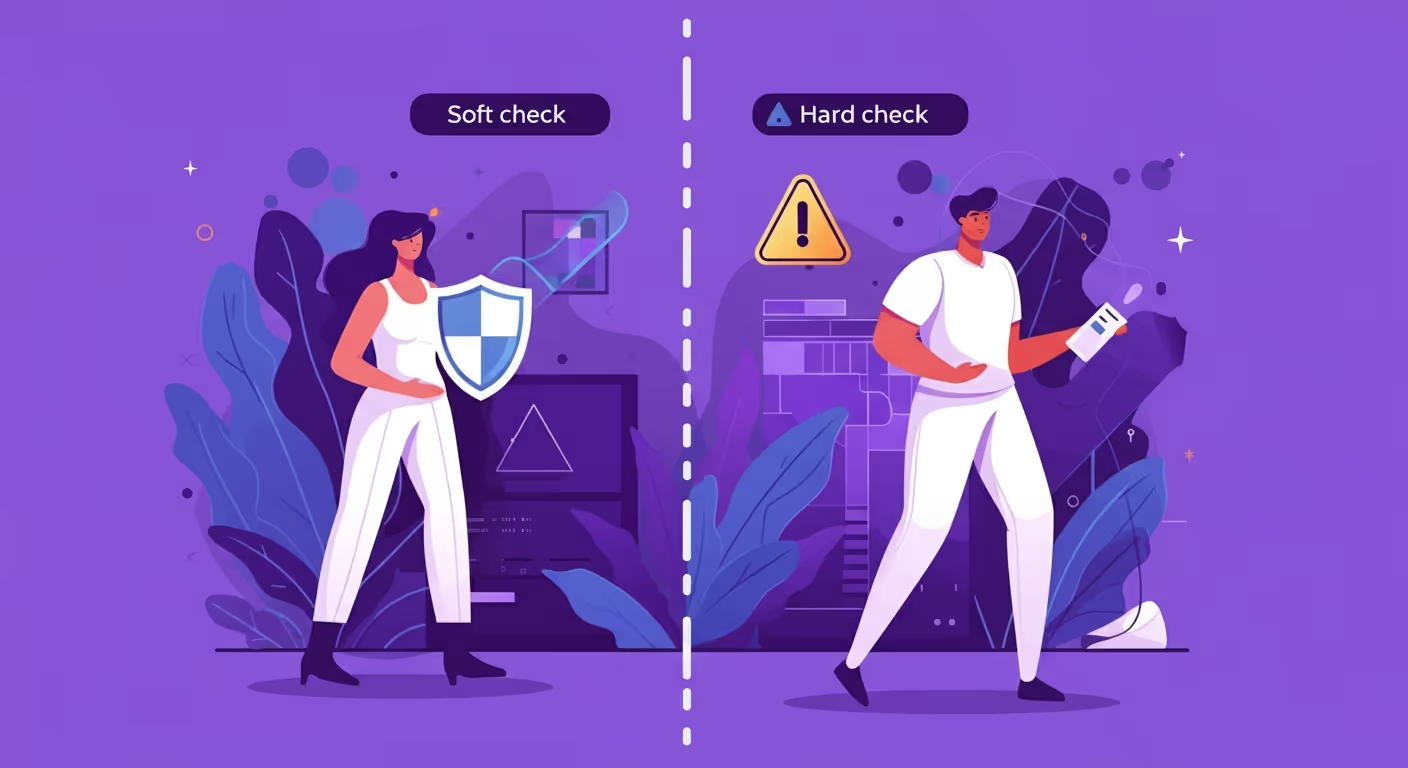Warning: Late repayment can cause you serious money problems. For help, go to moneyhelper.org.uk. We are a broker, NOT a lender.
If you've ever applied for a loan, credit card, mobile contract, or even a rental property, chances are your credit report was checked. But not all credit checks are the same — and some can affect your credit score more than others.
In this article, we’ll explain the difference between soft credit checks and hard credit checks, when each type is used, and how they can impact your ability to borrow in the future. Understanding the difference is essential for protecting your credit health and making smarter borrowing decisions.
A credit check (also called a credit search) is when a lender, broker, employer, or service provider reviews your credit history. Your credit report gives them insight into how you've managed borrowing in the past — including your repayment history, outstanding debts, and whether you've had any issues like defaults or CCJs.
The purpose of the check is to assess how risky it might be to lend to you or approve you for a financial product.
There are two main types of credit checks:
They differ not only in how they’re used, but also in how they appear on your credit file — and whether they affect your credit score.

A soft credit check is a basic look at your credit report. It doesn’t access your full history and doesn’t leave a footprint that other lenders can see.
Soft checks are typically used for:
The key thing to remember is that a soft credit check does not affect your credit score. Only you can see that it happened. It’s a safe way to explore your borrowing options without hurting your financial profile.
A hard credit check is a more detailed examination of your credit report. It is used when you formally apply for credit or a financial product, and the lender is making a decision based on your full credit history.
Hard checks usually happen when you:
Unlike soft checks, a hard credit check is visible to other lenders. It stays on your report for up to 12 months and can impact your credit score — especially if multiple hard checks are recorded in a short time.
While both types of credit checks involve looking at your credit file, they serve different purposes and have different consequences.
A soft credit check is more like a background peek — it’s discreet, safe, and doesn’t affect your score. A hard credit check, on the other hand, is a formal investigation. It can lower your score slightly, especially if you have several in a short period.
Think of it this way: a soft check helps you window-shop, while a hard check happens when you’re ready to buy.
That’s why it’s a good idea to use soft credit checks first — especially when comparing loan options.
If you're thinking about borrowing money, always start with a soft credit check. Many lenders and brokers (like Trust Credit) use soft searches to show you which loans you might be eligible for — without making a full application.
This gives you:
Once you’re ready to proceed, the lender will perform a hard credit check — but by then, you’ve already done the research and increased your chances of being accepted.
Every time a hard credit check is made, it's recorded on your credit file. While a single check isn’t a problem, multiple hard checks in a short period can signal to lenders that you're desperate for credit — which can make you look risky.
Too many hard checks can:
This is why it's so important to avoid applying to lots of lenders at once. Use soft check tools instead, and only proceed to a full application once you're confident the loan is a good fit.
You can check your own credit report at any time — and it’s free to do so through services like:
These tools will show both soft and hard checks, helping you understand who’s been accessing your credit data and how often.
It’s a good idea to review your credit file every few months to ensure:
Here’s a breakdown of common situations and which type of credit check they usually involve:
You’ll likely get a soft credit check when:
You’ll likely get a hard credit check when:
Knowing what to expect helps you make smarter decisions — and avoid accidentally hurting your credit when you’re just exploring your options.
At Trust Credit, we know how important your credit score is. That’s why our process starts with a soft credit check only. It takes less than a minute and won’t impact your score — but it gives you access to real loan options from our panel of regulated lenders.
We show you what you're eligible for based on your profile, not just your credit score. That way, you can make an informed decision with confidence, knowing your credit is protected.
Only once you choose a lender and proceed to a formal application will a hard credit check be performed.
Understanding the difference between a soft credit check vs hard credit check can help you borrow smarter and protect your financial future.
If you’re just checking what loans are available or comparing your options, always start with a soft search. It lets you see what’s out there without hurting your score.
When you’re ready to apply, be strategic — space out your applications, prepare your documents, and make sure the lender is right for you.
And remember: Trust Credit is here to help you compare loans the safe way — with soft credit checks, trusted lenders, and a transparent process.